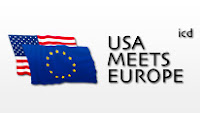X-Change Inc. - Developing Youth Exchanges to combat poverty and social exclusion - This training is organised by Leargas, the National Agency in Ireland for the management of national and international exchange and cooperation programms in education, youth and community work, and vocational education and training. The training will take place on March 04-06, 2011 in Dublin, Ireland.
This is an opportunity to meet project partners working with young people with fewer opportunities to develop youth exchanges through the Youth in Action programm particularly projects working across the theme of Combating poverty and social exclusion.
X-Change Inc. aims to provide space for participants to:
•Develop contacts and networks to engage in youth exchanges with other participants working with young people with fewer opportunities.
•Share information and experiences of their organisation, target groups and projects working across the theme of combating poverty and social exclusion
•Gain a clear view of the possibilities and priorities within the Youth in Action Programm
•Understand how to include non formal learning and Youthpass in your project
•Develop contacts and networks to engage in youth exchanges with other participants working with young people with fewer opportunities.
•Share information and experiences of their organisation, target groups and projects working across the theme of combating poverty and social exclusion
•Gain a clear view of the possibilities and priorities within the Youth in Action Programm
•Understand how to include non formal learning and Youthpass in your project
This seminar will be dynamic using interactive and non-formal learning methods.A mix of workshops, facilitated discussions and other active tools will be used in which the participants are invited to play a central role.The activities will be led by experienced facilitators in Youth Exchanges and working with youth people with fewer opportunities.
Eligibility
• at least 18 years of age and are able to communicate in English
• working with and interested in develop youth exchanges on the theme of combating of poverty and social exclusion
• working directly with young people with fewer opportunities
• knowing what their objectives are and knowing what their young people want to reach with a youth exchange
• a youth exchange within the framework of Youth in Action
• working with and interested in develop youth exchanges on the theme of combating of poverty and social exclusion
• working directly with young people with fewer opportunities
• knowing what their objectives are and knowing what their young people want to reach with a youth exchange
• a youth exchange within the framework of Youth in Action
Costs
Board, lodging and programme costs will be provided and paid for by the Irish National Agency of Youth in Action. The travel costs will be paid by the National Agency of Youth in Action in your country (Please contact them to check if they will support your participation). The Irish National Agency will request €50 participation fee from Irish participants. Please check with your own National Agency on application for confirmation of participant contribution.
Application
Fill in the application form, available here, and send it to:
Patricia Dalton
Leargas 189-193 Parnell Street Dublin 1 Ireland
Phone: +353 1 8731411 /+353 1 8871218
E-mail: pdalton@leargas.ie
Patricia Dalton
Leargas 189-193 Parnell Street Dublin 1 Ireland
Phone: +353 1 8731411 /+353 1 8871218
E-mail: pdalton@leargas.ie









